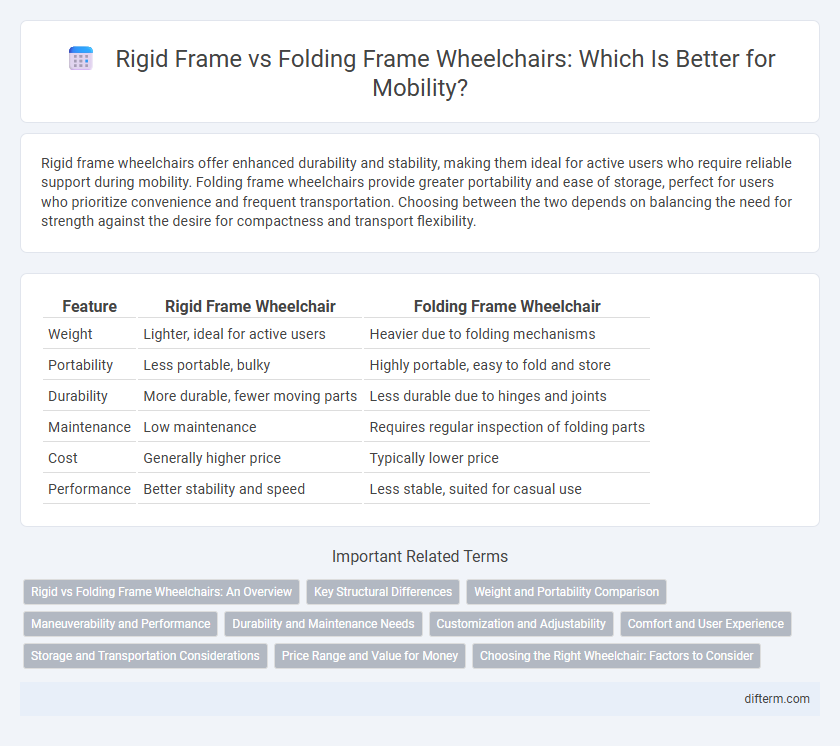Rigid frame wheelchairs offer enhanced durability and stability, making them ideal for active users who require reliable support during mobility. Folding frame wheelchairs provide greater portability and ease of storage, perfect for users who prioritize convenience and frequent transportation. Choosing between the two depends on balancing the need for strength against the desire for compactness and transport flexibility.
Table of Comparison
| Feature | Rigid Frame Wheelchair | Folding Frame Wheelchair |
|---|---|---|
| Weight | Lighter, ideal for active users | Heavier due to folding mechanisms |
| Portability | Less portable, bulky | Highly portable, easy to fold and store |
| Durability | More durable, fewer moving parts | Less durable due to hinges and joints |
| Maintenance | Low maintenance | Requires regular inspection of folding parts |
| Cost | Generally higher price | Typically lower price |
| Performance | Better stability and speed | Less stable, suited for casual use |
Rigid vs Folding Frame Wheelchairs: An Overview
Rigid frame wheelchairs offer enhanced durability, lighter weight, and improved energy efficiency, making them ideal for active users seeking performance and ease of transport. Folding frame wheelchairs provide greater portability and compact storage, which suits users needing convenience and adaptability for travel or daily use in varied environments. Both types deliver essential mobility solutions, with the choice depending on individual lifestyle, frequency of transportation, and specific ergonomic requirements.
Key Structural Differences
Rigid frame wheelchairs feature a fixed, solid frame designed for enhanced durability and improved energy transfer, resulting in increased speed and efficiency during mobility. Folding frame wheelchairs incorporate a hinged design that allows the chair to collapse inward, prioritizing portability and ease of storage despite a slight compromise in structural rigidity. The key structural differences influence user preferences based on lifestyle, with rigid frames favored for performance and folding frames for convenience.
Weight and Portability Comparison
Rigid frame wheelchairs typically weigh less than folding frame wheelchairs, enhancing maneuverability and ease of use for active users. The absence of folding joints reduces overall weight, making rigid frames more portable for transport and daily use. Folding frame wheelchairs, while heavier due to their adjustable structure, offer superior compactness when folded, making them ideal for storage and travel despite increased weight.
Maneuverability and Performance
Rigid frame wheelchairs offer superior maneuverability and performance due to their lightweight design and increased rigidity, allowing for smoother turns and faster speeds. Folding frame wheelchairs, while more portable, often sacrifice some agility and responsiveness because of their heavier weight and flexible joints. Users prioritizing efficient navigation and athletic performance typically prefer rigid frames for enhanced control and durability.
Durability and Maintenance Needs
Rigid frame wheelchairs offer superior durability due to their solid construction with fewer moving parts, resulting in less wear and tear over time. Folding frame wheelchairs require more frequent maintenance as their hinges and joints experience regular stress, increasing the likelihood of mechanical issues. Choosing a rigid frame model reduces long-term maintenance costs and enhances overall reliability for daily mobility needs.
Customization and Adjustability
Rigid frame wheelchairs offer superior customization options with a lightweight, durable design that can be tailored for specific mobility needs and body measurements, enhancing user comfort and performance. Folding frame wheelchairs provide adjustable features suitable for various postures but generally lack the same level of precision customization as rigid frames, making them ideal for users prioritizing portability over specialized fit. Both types support adjustability in seat height, back angle, and footrest position, but rigid frames excel in fine-tuning for optimal ergonomics and long-term use.
Comfort and User Experience
Rigid frame wheelchairs offer enhanced stability and a more responsive ride, which improves overall comfort for long-term users by reducing fatigue and pressure points. Folding frame wheelchairs provide greater portability and ease of transport, making them ideal for users who prioritize convenience but may experience slightly less rigidity and support. Users often report that while rigid frames excel in comfort during extended use, folding frames deliver better user experience in terms of adaptability and travel flexibility.
Storage and Transportation Considerations
Rigid frame wheelchairs offer a lightweight design with fewer moving parts, making them easier to maneuver but more challenging to compact for storage or transport. Folding frame wheelchairs feature a collapsible structure that simplifies storage in tight spaces and facilitates transportation in vehicles, though they may weigh more and require additional maintenance. Choosing between these options depends on balancing portability needs with ease of handling and durability for daily use.
Price Range and Value for Money
Rigid frame wheelchairs generally come at a higher price range, reflecting their lightweight construction and enhanced durability, which offers superior value for money for active users seeking long-term performance. Folding frame wheelchairs are typically more affordable, providing practical value for those prioritizing portability and ease of storage without the premium cost. Choosing between the two depends on balancing upfront cost with durability, weight, and intended usage frequency.
Choosing the Right Wheelchair: Factors to Consider
Selecting the right wheelchair requires evaluating key factors such as portability, durability, and user lifestyle. Rigid frame wheelchairs offer enhanced stability and lighter weight, ideal for active users seeking performance, while folding frame wheelchairs provide compact storage and ease of transport, suited for frequent travelers or those with limited vehicle space. Assessing individual mobility needs, daily activities, and transportation options ensures the optimal balance between comfort, functionality, and convenience.
Rigid frame wheelchair vs Folding frame wheelchair Infographic

 difterm.com
difterm.com